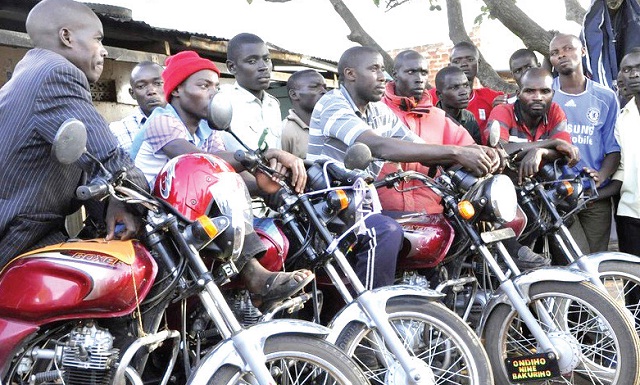
Kampala, Uganda | THE INDEPENDENT | One in ten boda boda riders operating in Kampala are using cannabis, cocaine, crystal methamphetamine or other addictive drugs. This is according to a study by Makerere University.
The researchers at the department of population studies say they interviewed and tested over 780 riders in four Kampala divisions of Makindye, Nakawa, Rubaga and Kawempe where they would flag down whoever was carrying a passenger or one that had just dropped off a customer.
Prof. Betty Kwagala, the principal investigator on the study says that they used a test kit where they would do an oral or saliva swab on whoever agreed.
Apart from testing for drug use, scientists also assessed whether riders own valid licenses and if they ever underwent any form of training before joining the trade. Just 3% had undergone a form of training whereas 11% possessed permits.
Asked why they didn’t have permits, Dr Patricia Ndugga says the majority of the riders said the process of acquiring a permit is tedious and costly to many.
Richard Ssendi, the Head of Planning at the Ministry of Works and Transport said that riders require about 300,000 Shillings to process a permit. He adds that the study by the scientists will be discussed to reform the sector.
As part of the recommendations, the researchers said that boda boda riders ought to be tested for drug use before renewing their permits in addition to putting in place training institutions that give riders basics before going joining the business.
However, for the riders that accepted to be enrolled into care to stop using drugs, they were referred to a local NGO Harm Reduction Uganda for rehabilitation.
Twalib Wamala, the Executive Director says the riders were in turn referred to Butabika hospital for free treatment.
The study was paid for by the government through the Makerere University Research and Innovations Fund (MAK RIF), although the researchers say it only gives part of the story as they predict the burden could be bigger considering that they only involved cyclists who work during the day because of the COVID-19 curfew restrictions.
The main triggers of drug use, the respondents reported they wanted to be energized and stay awake for long hours while some said they were stress relievers.
*****
URN
 The Independent Uganda: You get the Truth we Pay the Price
The Independent Uganda: You get the Truth we Pay the Price



